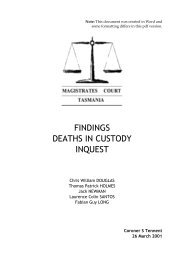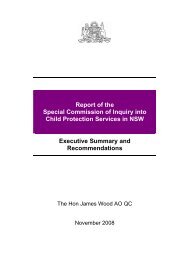R V BIRKS
R V BIRKS
R V BIRKS
Create successful ePaper yourself
Turn your PDF publications into a flip-book with our unique Google optimized e-Paper software.
evidence in the form of affidavits from the barrister and his instructing<br />
solicitor was adduced in this Court. It was made clear to this Court, and<br />
accepted by both sides, that the appellant's barrister was well aware of the<br />
problem that had arisen as a result of his oversight at a time no later than<br />
during the cross-examination of the appellant at the trial. There were various<br />
steps that he could have taken before the conclusion of evidence to seek to<br />
remedy the situation. For example, he could have called his instructing<br />
solicitor to support the appellant's evidence as to the instructions given by<br />
the appellant to his lawyers. As a last resort, he could have returned his brief<br />
in the matter and given evidence himself. His reason for not doing any of<br />
those things was not based on some tactical decision, but was that he simply<br />
did not know what to do. It appears that he hoped that the problem would<br />
become submerged in the mass of other detail but the consequences of his<br />
error became more and more obvious during the course of the address of<br />
the Crown Prosecutor and the summing-up. Finally, and apparently in some<br />
desperation, after the conclusion of the summing-up, he took the advice of a<br />
colleague at the bar and was advised at that stage to take the course<br />
described above.<br />
The appellant contends that all this resulted in a miscarriage of justice. In<br />
order to deal with that submission it is necessary to consider with some<br />
particularity the features of the matter which are said to give rise to that<br />
miscarriage. The first concerns the conduct of counsel, including his failure<br />
to cross-examine the complainant on important issues and his subsequent<br />
failure to take steps to deal with the problem after it had become obvious.<br />
In our system of criminal justice a trial of an accused person is conducted<br />
in the manner of a contest between the Crown and the accused, and that trial<br />
has many (although not all) of the features which attend civil litigation<br />
conducted in accordance with what is sometimes described as the adversary<br />
system of justice. To a large extent the parties to such proceedings are bound<br />
by the manner in which they conduct them. It is the parties who decide, for<br />
example, what information will be put before a tribunal of fact, and the<br />
tribunal bases its decision on that information.<br />
As a general rule, a party is bound by the conduct of his or her counsel,<br />
and counsel have a wide discretion as to the manner in which proceedings<br />
are conducted. Decisions as to what witnesses to call, what questions to ask<br />
or not to ask, what lines of argument to pursue and what points to abandon,<br />
are all matters within the discretion of counsel and frequently involve<br />
difficult problems of judgment, including judgment as to tactics. The<br />
authorities concerning the rights and duties of counsel are replete with<br />
emphatic statements which stress both the independent role of the barrister<br />
and the binding consequences for the client of decisions taken by a barrister<br />
in the course of running a case. For example, in Rondel v Worsley [1969] 1 AC 191 at<br />
241, Lord Morris of Borth-y-Gest quoted with approval the<br />
following statement of the Lord President in the Scottish case of Batchelor v<br />
Pattison and Mackersy (1876) 3 R (Ct of Sess) 914, concerning the role of an<br />
advocate:


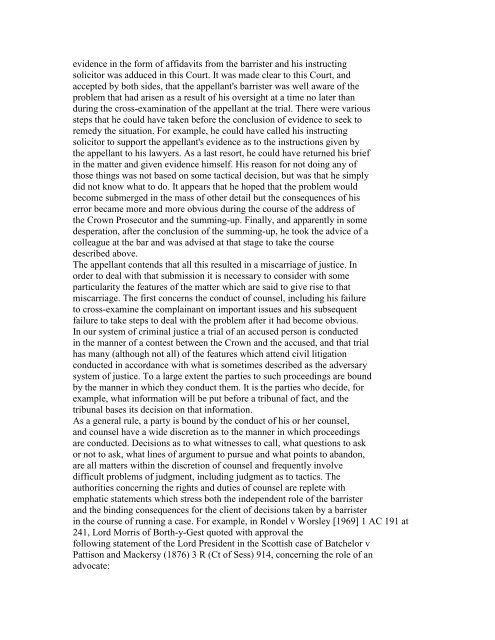
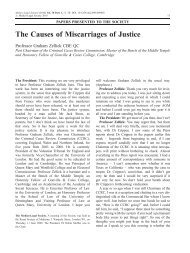
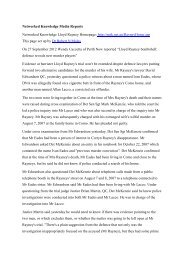
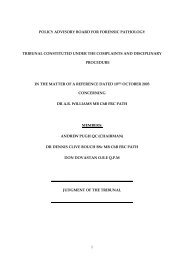
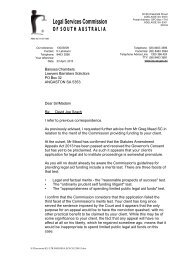
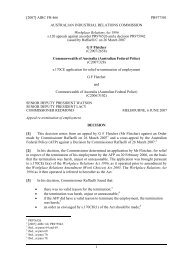
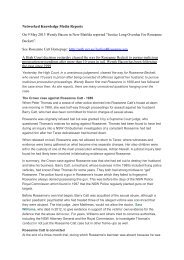
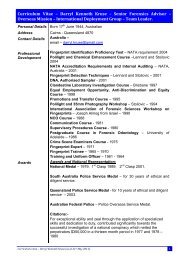
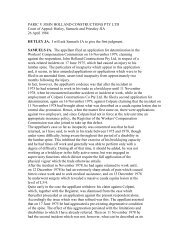
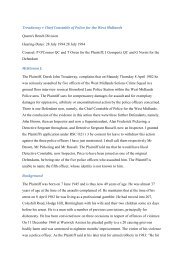
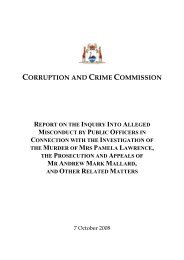
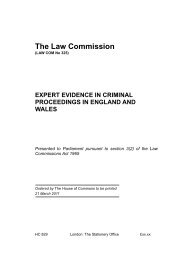

![R v Gilham [2012] NSWCCA 132 - verdicts of acquittal](https://img.yumpu.com/40383571/1/184x260/r-v-gilham-2012-nswcca-132-verdicts-of-acquittal.jpg?quality=85)
